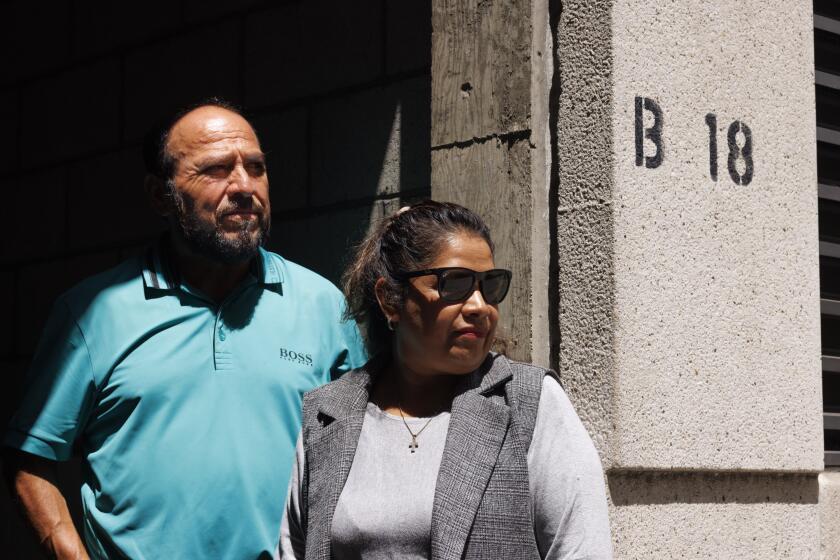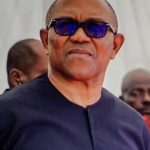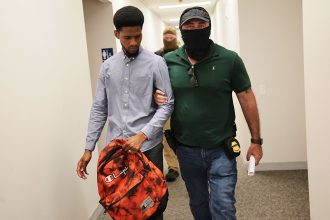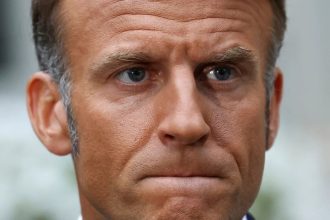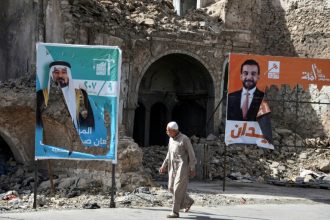The strawberry delivery driver was making his last drop-off in Little Tokyo, unloading nearly a dozen boxes onto the sidewalk outside the Japanese American National Museum.
Inside the building, California Gov. Gavin Newsom and his allies were holding a news conference about a Democratic Party plan to fight back against President Trump’s efforts to maintain control of the U.S. House of Representatives through redistricting in Texas.
Angel Rodrigo Minguela Palacios knew nothing of the powerful men’s clash as he stacked cardboard boxes filled with ripe, red fruit Thursday morning. He also didn’t know that dozens of Border Patrol agents were massing nearby.
Minguela was caught between the two spectacles. His life was about to be upended.
In the days that followed, Newsom accused the Trump administration of trying to intimidate the president’s political opponents by sending the immigration agents. Department of Homeland Security spokeswoman Tricia McLaughlin has said the agents were “focused on enforcing the law” not on Newsom.
Newsom has since submitted a Freedom of Information Act request seeking records from the administration about why agents arrived at the museum as he was announcing his latest skirmish with the president.
For Minguela, who has been in the country for close to a decade, that day felt a lot more personal. He was arrested by Border Patrol agents and now faces deportation back to Mexico. Speaking from behind a plexiglass window at the “B-18” federal detention center in downtown L.A. on Monday, Minguela stressed that he is not a criminal.
“One comes here to work, not commit crimes,” said Minguela, who wore the same red T-shirt and jeans he’d been arrested in four days prior.
When asked last week whether the person arrested outside the news conference had a criminal record, a Homeland Security spokesperson said the agency would share a criminal rap sheet when it was available. After four follow-up emails from a reporter, McLaughlin on Saturday said agents had arrested “two illegal aliens” in the vicinity of Newsom’s news conference — including “an alleged Tren de Aragua gang member and narcotics trafficker.”
Asked twice to clarify whether the alleged gang member and narcotics trafficker were the same person, Homeland Security officials did not respond. But when presented with Minguela’s biographical information Monday, the department said he had been arrested because he overstayed his visa — a civil, not criminal, offense.
Border Patrol Sector Chief Gregory Bovino told Fox News on Aug. 15 that operations were based on intelligence about the alleged Tren de Aragua gang member. They arrested that man two blocks away from Newsom’s news conference.
Two law enforcement sources who asked to remain anonymous as they were not authorized to speak with the media told The Times they had received word from federal authorities that Little Tokyo had been targeted because of its proximity to the Newsom event.
For those who know Minguela, it felt like mala suerte — bad luck.
As Martha Franco, one of Minguela’s employers, put it, “He was in the wrong place at the wrong time.”
::
Like every other weekday, Minguela rose before the sun to start his 2 a.m. delivery route Thursday. He had around eight places to hit.
He’d worked for the same produce company for around eight years and never missed a day.
That day, Minguela left his partner and their three children — ages 15, 12 and 7 — asleep in their home, hours before the kids would head off for their first day of school. His partner, who asked not to be named for fear of retaliation, had worked the night before as a cashier at a liquor store. She did not get off work until about 12:30 a.m. She brought him coffee as he started his day.
Shortly before 6 a.m., Minguela called his partner to wake her up so she could take the kids to school. Throughout the morning, they checked in with each other on how the day was progressing.
She called to warn him about immigration agents at Slauson and Miles avenues in Huntington Park. Over the last couple of months, as immigration raids became a part of daily life, the couple’s world had slowly shrunk.
Minguela had overstayed a tourist visa after fleeing the Mexican state of Coahuila in 2015 because of violence he faced there, his partner said. She said he had worked servicing ATMs there, was kidnapped twice and at one point was stabbed by people intent on stealing the money. After his employers cut staff, she said, he lost his job, helping drive his decision to leave.
Because he was undocumented, he rarely went out, leaving the house only for work and errands. Minguela began wondering whether it was even safe for him to pick up the kids from school, his partner said. He planned ahead, made copies of his keys and left money for his family in the event that he was grabbed by immigration agents.
That morning, he reassured his partner he was fine. He was heading to his last stop at a tea room in Little Tokyo.
“Ten mucho cuidado,” his partner told him.
Be very careful.
::
The Border Patrol agents descended on 1st Street in Little Tokyo about 11:30 a.m., just as Newsom’s news conference got underway.
They were decked out in camouflage and helmets, their faces obscured by black masks. One wore an American flag neck gaiter. They were armed, some with AR-15-style weapons.
Read more: Border Patrol agents stage show of force at Newsom’s ‘big beautiful press conference’
Nearby, Minguela was busy unloading several boxes of strawberries and a box of apples. He didn’t notice the agents until they were close behind him. Then, he ducked back inside the van.
A video shared with The Times shows at least eight Border Patrol agents as they passed the van, its side door wide-open. They did not stop. Then, one appeared to double back and peek inside.
Minguela said he feels he was targeted based on his physical appearance.
When the agent began asking him questions, Minguela said he pulled a red “know your rights” card out of his wallet and handed it to the agent.
“This is of no use to me,” he said the agent told him. Another agent soon joined them.
Minguela told them he didn’t have to talk. But they kept asking questions, he said. What was his nationality? What was his name? Did he have papers?
“They demanded I show them some kind of identification,” he said. “Insisting, insisting.”
The agents were armed, and Minguela said he grew scared. Believing he had no choice, Minguela said, he gave one of the agents his California driver’s license.
Minguela tried to call his partner twice, but she was at a doctor’s appointment and couldn’t answer. At 11:22 a.m., he sent her three WhatsApp messages:
“Amor ya me agarró la migra..no te preocupes.”
“Todo va a estar bien.”
“Diosito nos va a ayudar mucho.”
Federal agents produced a show of force outside the Japanese American National Museum, where Gov. Gavin Newsom was holding a redistricting news conference on Aug. 14. (Carlin Stiehl/Los Angeles Times)
Immigration had gotten him, he said, but everything would be fine. God would help them, he assured her.
Minguela sent her a picture of an agent holding his license and seemingly plugging the information from it into a phone. Then, the agent arrested him.
Video captured Minguela, hands cuffed behind his back, as the agent linked an arm through his. He walked Minguela away from the van, toward Bovino.
After conferring with colleagues, the agent walked Minguela back toward his delivery van. Bovino patted the agent on the back and said, “Well done.”
At about the same time, one of Minguela’s employers, Isaias Franco, received a call from Little Tokyo warning him about the immigration activity. He immediately called Minguela, whose cell number is saved in his phone under “paisa,” countryman. Both hail from the Mexican city of Torreón.
No answer.
Franco texted him, trying to tell him what was unfolding.
By that time, though, Minguela was already in handcuffs.
::
Hours before visitation began at the detention center in downtown L.A. on Monday, families began lining up along a driveway where “B-18” was stamped in black on a concrete wall.
Someone had scrawled on the ground in chalk: “Abolish ICE” and “Viva La Raza.” Another message read, “Civil disobedience becomes a duty when the state becomes lawless and corrupt.”
By 11:30 a.m., 18 people were waiting for visitation to start at 1 p.m. In less than an hour, that number had ballooned to 33.
Three siblings there to visit their uncle who had been arrested at a car wash in Long Beach the day before. A woman whose uncle was taken from a Home Depot in Pasadena. Two sisters whose loved one had been arrested at an Immigration and Customs Enforcement check-in.
They carried bags of medication and sweaters for detained loved ones, because they’d heard it was cold inside. Each person hoped to get in before visitation ended at 4 p.m., although it seemed increasingly unlikely for those at the back of the line.
Martha and Isaias, Minguela’s employers, were among the hopeful. It was their third attempt to see him. The day of Minguela’s arrest, they got there too late.
The next day, they arrived earlier and were in luck. On the advice of others in line, they brought a jacket to keep Minguela warm.
In the years they’ve employed Minguela, they’ve only ever seen his serious, professional side. But during the five minutes they got to visit with him Friday, he spent most of it in tears, hardly able to speak.
The couple assured him they would help however they could.
They returned on Monday, this time bringing a blue Ralph Lauren shirt and a pair of black New Balance socks so he could change clothing. Isaias and the couple’s son, Carlos, had both come, despite starting their workday at 2 a.m.
“We’re going to be with him until the end,” Martha said. “He’s part of our family. He’s one of us.”
As the hours wore on, people in line squatted or sat on the concrete to rest their aching legs. Martha flitted around, advising people to bring sweaters for loved ones and letting them know the officers allowed in only one item of clothing for each detained person.
By the start of visitation, 44 people were in line. Martha was No. 19. Families exited red-eyed, tears dripping down their cheeks after getting only a few minutes with their loved ones.
About 3 p.m., after waiting three and a half hours, the Francos handed the officer their passports and identification, before finally making it inside. They had to turn off their phones. They could give Minguela only the T-shirt. The officer said no to the socks, a prohibited second item of clothing.
Minguela beamed when he saw the Francos, who greeted him through the plexiglass window. He was trying to maintain his spirits, but said he felt “impotente.” Powerless.
The Francos told him not to sign anything.
“Vamos a estar con usted,” Isaias told Minguela, letting him know they would be with him. He and Carlos fist bumped Minguela through the Plexiglass.
“Échale ganas,” Isaias added, keep going.
::
Minguela’s children have hardly stopped crying since his arrest.
During the eight years he and his partner have been together, he’s helped raise her two children and their 7-year-old son, who is autistic.
Minguela’s lawyer, Alex Galvez, said the hope is that his client will be released on bond, as he initially entered the country lawfully and is the primary breadwinner for the family. The lawyer said he believes Minguela was arrested in defiance of a federal judge’s order that immigration authorities cannot racially profile people or use roving patrols to target immigrants.
“It was a political opportunity. He was one of the two guys picked up right during Newsom’s press conference,” Galvez said. “They had to show something for it.”
Just days before his arrest, Minguela’s family had celebrated his 48th birthday. His partner made him his favorite dish, shrimp ceviche.
Her birthday was Tuesday. The family had planned to go on a rare outing for a dinner of enchiladas de mole.
But they spent the day without him. There was no celebration.
The children asked their mother, as they have every day for nearly a week: When is papá coming home?
Times staff writer Richard Winton contributed to this report.
This story originally appeared in Los Angeles Times.


